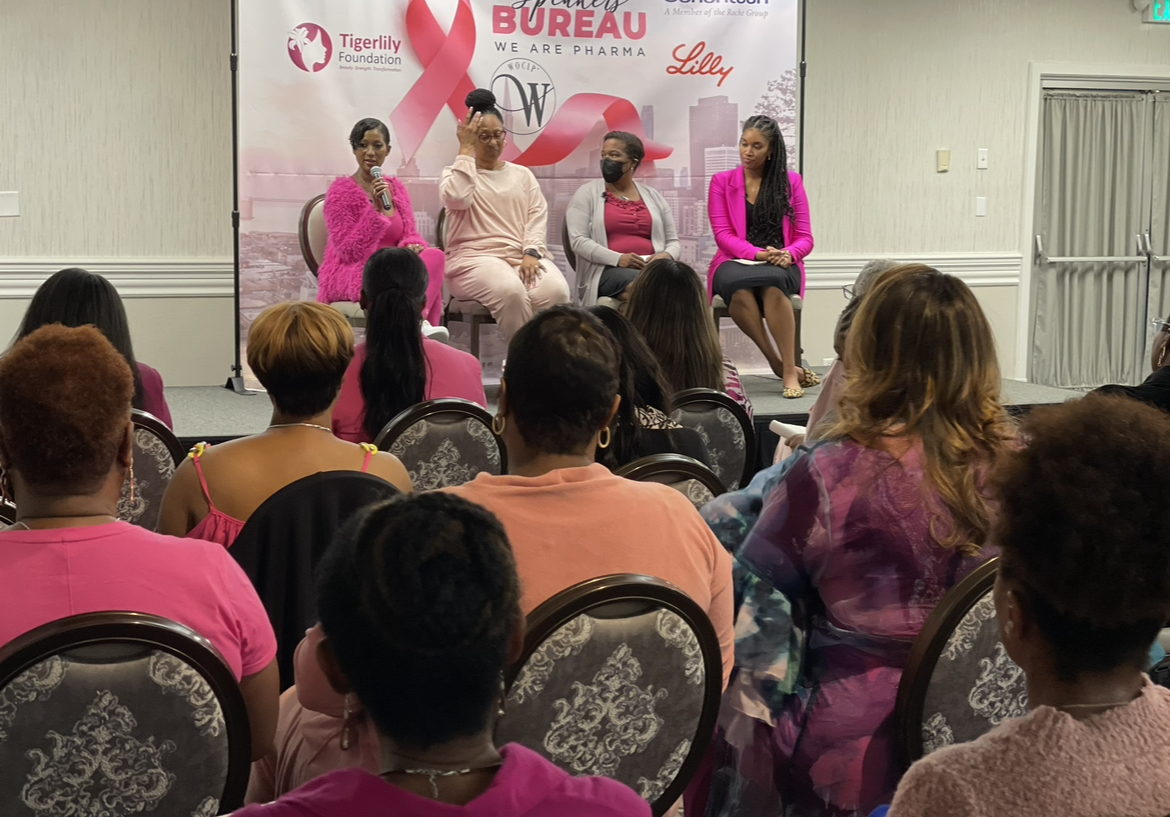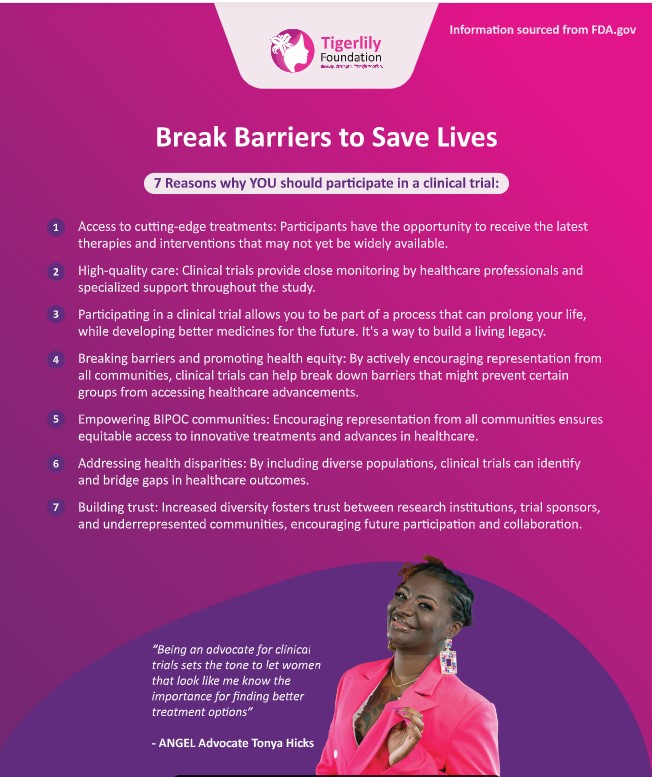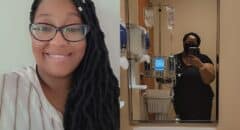
In the realm of medical research, a stark reality persists—Black people make up less than five percent of clinical trial participants, underscoring a troubling gap in equitable representation. What’s even more alarming is that this underrepresentation is intricately linked to disproportionately high death rates across various diseases within the Black community. Consequently, these challenges not only hinder the diversity of trial participants but also impact the quality of decision-making around treatment protocols. As a result, Black individuals facing serious diagnoses often find themselves navigating a landscape with fewer options and less contextualized care.
As a method of addressing these challenges, Tigerlily Foundation, in partnership with global pharma company GSK, just launched the My Living Legacy Campaign, a national initiative to educate and empower Black communities on the benefits of enrolling in clinical trials for chronic diseases and cancers.
“One of the priorities for GSK is really to make sure that our clinical trials are representative of the patients that actually get the disease… and make sure that we are decreasing barriers so that all patients have equal access to the clinical trials,” says Nisha Patel Engagement Director, Global Demographics and Diversity at GSK.

It’s an issue Maimah Karmo, Tigerlily Foundation CEO, also feels passionate about.
“I am a 17-year breast cancer survivor… and one of the things that was really shocking to me was that nobody was talking to a young woman about the importance of being educated about breast cancer and knowing what to do if there was a sign or symptom,” Karmo shares. “My goal was to also figure out how do I reframe how people think about clinical trials… to create a living legacy of equity in targeted treatments through a new way of engaging people, listening to them, hearing them, learning from them and co-creating with them.”
Encouraging Participation in Clinical Trials
“We want to be inclusive and make sure that people have access to our trials not only to ensure health equity, but also to make sure we can generate the safety and efficacy data reflective of the population who get the disease,” Patel adds. “When we educate around clinical trials, that empowers patients to take their own health into their own hands.”
“Now it’s becoming this beautiful thing where we see Black women talking about trials in a way that can transform the legacy of the past into one that’s a beautiful future for Black and brown women,” Karmo adds.
True to Karmo’s claim, breast cancer survivor Keisha Stephney, who experienced a delayed diagnosis during the COVID-19 pandemic, enrolled in clinical trials and was just accepted into a congressionally directed medical research program, now sees the importance of clinical trials despite an initial fear. She hopes that by addressing the stigma surrounding clinical trials people of color will be encouraged to consider these opportunities.

A Delayed Diagnosis
Stephney’s journey began in April 2021, a time when the world was grappling with the effects of a global pandemic. Scheduled for a routine mammogram in July 2020, she faced obstacles as healthcare facilities temporarily halted such check-ups. Battling through closures and restrictions, she finally secured an appointment in April 2021.
Amidst getting the COVID-19 vaccine, Stephney was urged to follow a six-week waiting period post-vaccination; however, her gut told her to follow through with the mammogram. The mammogram revealed an unsettling discovery.
Navigating the Diagnosis
“The navigator told me that based on what they saw in the ultrasound, they were 95 percent sure that it was breast cancer,” Stephney shares.
The next day, Stephney went in for a biopsy to confirm the diagnosis. The shock, fear, and emotional turmoil enveloped her as the reality of the diagnosis sank in.
“I remember walking to the car and I just had a complete emotional breakdown in my car because no one knew what was happening. I hadn’t told anyone. I just started thinking all these thoughts…it just was such an awful experience,” Stephney recalls adding that she wishes she’d had someone with her at the appointment for emotional support, but wasn’t afforded the opportunity.

Treatment Journey
The path that followed was what Stephney describes as impersonal.
“I didn’t have an opportunity to interview an oncologist,” she shares. “I couldn’t really get a feel of what the doctor’s like. It just felt so structured to me – it was very impersonal and I didn’t like that but at the time I didn’t have a choice, that’s what they were offering,” Stephney recalls of her Zoom appointment.
After being told she had stage 2 triple-negative breast cancer, Stephney’s doctor made recommendations for treatment. Ultimately, she underwent 16 rounds of chemotherapy and 25 rounds of radiation. She also opted for a bilateral mastectomy.
“I just wanted to give myself the best chance of survival,” Stephney shares.
The physical and emotional toll of the treatments, compounded by an unexpected infection post-surgery, added layers of trauma to an already challenging journey.
“I ended up having to have another emergency surgery and that was another traumatizing event,” Stephney notes, adding that her instincts that something was wrong were driven by a distinct odor.
Despite Stephney’s persistent efforts to convey the severity of her symptoms to her surgeon, it took considerable persuasion to prompt an examination. To her alarm, the surgeon identified the presence of necrosis at the scar site during the examination. However, in a disconcerting turn of events, the surgeon initiated cutting away at the affected area without offering any explanation or warning. With the aftermath of surgery leaving Stephney devoid of sensation, she could only experience the traumatizing event through the unsettling sound of slicing, leaving both her and her husband deeply distressed.
The next day, Stephney underwent another surgery to address the complications.
“For the subsequent five or six months, I lived with an implant on one side, while the other remained flat,” Stephney shares. Following this challenging period, Stephney embarked on a series of 25 rounds of radiation.
“The journey through these medical ordeals was not only physically taxing but emotionally and mentally draining, leaving an indelible mark on my life,” she say,s adding that after radiation, she was told to go back to work.
Life After Treatment
As treatments concluded, another daunting phase emerged—survivorship.
Wrapping her mind around what life would be like after diagnosis and going back to work also took an emotional toll on her.
“The survivorship part of it all has been on some days harder than the diagnosis,” Stephney shares, emphasizing the need for continued education on post-treatment life and addressing the emotional toll and uncertainties survivors face.
Advocating for Yourself
The survivor also highlights the importance of self-advocacy, which she’s learned throughout her journey.
The message is clear—never stop advocating for yourself. Feel empowered to voice concerns, ask questions, and be an active participant in your care.
“I was able to tell them this is not right or this doesn’t feel right and what makes me more comfortable and what doesn’t make me comfortable. I felt more empowered to use my voice,” Stephney shares.
In fact, Stephney’s newfound role as an advocate helped her get a diagnosis when her cancer returned.
Stephney’s passion for advocacy and clinical trials was also empowered by the education she gained through the Tigerlily ANGEL program, which helped her learn how to navigate her treatment journey.

“Tigerlily acts as a driver kit, empowering trained women to advocate for policy changes, challenge healthcare systems, and promote inclusivity in research and scientific development,” Karmo says.”Being an ANGEL provides you with an opportunity to know more about yourself and your family’s risk factors, how to act on those risk factors, and how to be proactive with your health and give back to the community as well.”
Words of Wisdom
For those considering advocacy or involvement in cancer research, Stephney offers valuable advice: prioritize self-care and acknowledge the potential toll of advocacy on mental health.
She also emphasizes the importance of finding your passion within the advocacy space and focusing on that, adding that for her, the importance is knowing your family health history and clinical trials.
“Find your purpose and walk in that, and it’s gonna hold you up every single time,” Stephney concludes.









